Feeling “sick to your stomach” once in a while might be just a part of life – but that doesn’t mean we have to suffer through it!
Nausea, or an upset stomach, is one of the most common digestive issues with a range of potential causes including motion sickness, acid reflux, pregnancy, indigestion, or as a side effect of certain medications.
When your stomach is out of sorts, you just want relief – fast! Luckily there are plenty of safe and natural home remedies for bloating, nausea, and vomiting relief and prevention. Here we’ll share some of the best herbal upset stomach remedies so the next time you’re feeling bloated or queasy, you’ll know what to do!
Tummy Troubles in Traditional Chinese Medicine (TCM)
Tummy troubles have frustrated us humans since the beginning of time. That’s why many of the classical Chinese herbal formulas are dedicated to alleviating abdominal discomfort and restoring belly balance.
In the West, we usually attribute upset stomach and other gastrointestinal issues to a physical cause, like bacteria, viruses, or food allergens. In Eastern medicine practice, however, symptoms like bloating, nausea, and vomiting are seen as manifestations of imbalances within the body’s own energy systems. Even when there is a pathogen present (like a stomach bug), TCM addresses both the “invader” and the body’s internal environment to restore health and prevent future attacks.
But what about stomach issues that aren’t related to an infection?
TCM diagnoses these issues based on patterns of imbalance, rather than “disease.” Each pattern outlines the underlying issues that can lead to an upset stomach, and has a unique set of symptoms and causes.
For instance, one common pattern of imbalance is a disturbance in the flow of Stomach Qi. Rather than flowing downwards through the GI tract as it should, Stomach Qi flows upwards, leading to symptoms like nausea, vomiting, and belching. This condition is often attributed to emotional stress, dietary habits, or other factors disrupting the natural flow of Qi.
Dampness is another type of TCM imbalance that can lead to an upset stomach. Dampness (excess fluids) can accumulate in the body due to improper diet, environmental factors, or a deficiency in the Spleen’s ability to transform and transport fluids. Some common symptoms of dampness include a feeling of heaviness, bloating, nausea, weight gain, and a thick, sticky coating on the tongue.
Other factors such as wind, cold, and heat, can invade the body and disturb the Stomach’s function, leading to acute symptoms like sudden vomiting, abdominal pain, and diarrhea. These are most closely related to concepts like food poisoning or the stomach flu in the West.
Traditional Chinese Medicine Take: Bloating
If you’ve ever felt overly full, puffy, or distended in your belly, you’ve been bloated. Bloating is a common response to eating too much, abdominal inflammation, and even PMS.
In the context of TCM, however, bloating extends beyond the simple feeling of a full or distended abdomen. It encompasses a range of symptoms including discomfort, a sensation of fullness even after eating small amounts, and in some cases, gas or changes in bowel habits. Bloating is often associated with other digestive issues such as indigestion, constipation, or diarrhea – all signs that point to an underlying imbalance within the body’s energy systems.
What Causes Bloating?
In TCM, bloating can occur from a wide range of potential factors. For instance, anything from dietary habits to emotional stress to organ dysfunction can lead to that bloated sensation.
One of the most common causes is consuming cold, raw, or difficult-to-digest foods. This can impair the Spleen’s ability to transform and transport nutrients, which then leads to a buildup of dampness and phlegm that cause uncomfortable distention. Cooking warming foods and drinking warm, bloat-reducing teas can help bring your belly back to balance.
Emotional distress, particularly worry and overthinking, can also affect the Spleen and Stomach and disrupt the smooth flow of Qi. This leads to abdominal stagnation, AKA bloating and gas.
Bloating and Patterns of Imbalance
In TCM, bloating itself is not a disease, but a symptom of imbalance. What causes this imbalance can vary based on the other symptoms you are experiencing and your general constitution. Here are some of the most common diagnoses:
- Spleen Qi Deficiency
With this imbalance, the Spleen’s ability to perform its digestive functions is weakened, leading to symptoms like bloating, fatigue, and a pale tongue with a thin coating. - Dampness in the Spleen
This imbalance is related to Spleen Qi Deficiency, but characterized by the accumulation of dampness in the abdomen. When the Spleen is unable to manage fluids properly, fluids build up and block circulation which leads to symptoms such as bloating, a feeling of heaviness, and a sticky tongue coating. - Liver Qi Stagnation
When emotional stress impedes the flow of Qi, it causes “stagnation” or friction in the Liver system. Since the Liver regulates the smooth flow of digestion, this can lead to abdominal distension and discomfort.
3 Chinese Herbal Formulas for Bloating Relief
-
Sale!
 Xiao Yao Tang (Free And Easy Wanderer) – Liquid Extract (Tincture)
Starting at $14.00
Add to CartSelect options
This product has multiple variants. The options may be chosen on the product page
Xiao Yao Tang (Free And Easy Wanderer) – Liquid Extract (Tincture)
Starting at $14.00
Add to CartSelect options
This product has multiple variants. The options may be chosen on the product page
Xiao Yao Tang (Free and Easy Wanderer Tincture)
This formula is particularly effective for bloating related to Liver Qi Stagnation. By soothing the liver and strengthening the spleen, it helps to ensure the smooth flow of Qi and alleviates symptoms of stress-related bloating, improving digestion and emotional well-being.
Ping Wei Wan (Calm the Stomach Pills)
Aimed at dispelling dampness and moving Qi, this formula is suited for bloating associated with Dampness in the Spleen. It contains herbs that dry dampness, promote the movement of Qi, and strengthen the spleen, reducing bloating, and enhancing digestive health.
Liu Jun Zi Wan (Six-Gentlemen Teapills)
Best for those with a root in Spleen Qi Deficiency, this formula uses herbs that tonify the Spleen and Stomach, remove dampness, and improves the function of the digestive system. It is particularly helpful for chronic bloating, poor appetite, and fatigue, promoting overall digestive health and natural energy.
Traditional Chinese Medicine Take: Nausea
Nausea is that unsettling feeling in the pit of your stomach. From obvious offenders like spoiled food and medications to more subtle issues like hormones, motion sickness, and stress, there are countless factors that can trigger nauseas. In Chinese medicine, nausea is most commonly a sign that the harmony of the “earth” organs (the Spleen and Stomach) is out of balance.
What Causes Nausea
In TCM, nausea is a result of a disruption in the natural downward flow of Stomach Qi. Instead of moving food and energy downward for digestion and absorption, the Qi reverses direction, pushing contents upwards and resulting in nausea.
Several factors can cause this disharmony and lead to nausea. For example, excess phlegm or dampness can cause feelings of fullness and heaviness in the middle. Emotions like anger, fear, and worry can also have an impact on the Stomach and cause nausea or a lack of appetite. Medications, pregnancy, and illnesses can change the natural flow of energy and cause an upset stomach.
Nausea and Patterns of Imbalance
Like bloating, nausea has several potential underlying patterns of imbalance. Here are a few of the most common causes of nausea in TCM:
- Stomach Heat
This occurs when an excess of heat in the stomach disrupts its function, leading to symptoms like nausea, bad breath, and a thirst for cold or iced drinks. The heat irritates the stomach lining and impairs its ability to move Qi downwards. Instead, Qi moves up and causes nausea. - Liver Overacting on Stomach
If you’ve ever lost your appetite after hearing bad news or getting angry, you’ve experienced this pattern. Emotional stress or Liver Qi stagnation can cause the Liver to overact on the Stomach, disrupting the flow of Qi and leading to nausea, belching, and sometimes vomiting. - Spleen Qi Deficiency
When the Spleen is weak, it cannot transform and transport food essence properly. This can lead to the accumulation of dampness and the rise of Qi in the wrong direction (up), which manifests as nausea and a feeling of fullness (even after eating just a small amount).
3 Chinese Herbal Formulas for Nausea Relief
Ban Xia Hou Po Wan (Pinellia and Magnolia Teapills)
This formula is particularly effective for nausea caused by a buildup of phlegm and emotional stress that leads to Qi stagnation. It works by promoting the downward movement of Qi, dissolving mucus, and alleviating throat and chest discomfort, addressing the root cause of nausea.
-
Sale!
 Wen Dan Tang (Warm the Gallbladder) – Liquid Extract (Tincture)
Starting at $14.00
Add to CartSelect options
This product has multiple variants. The options may be chosen on the product page
Wen Dan Tang (Warm the Gallbladder) – Liquid Extract (Tincture)
Starting at $14.00
Add to CartSelect options
This product has multiple variants. The options may be chosen on the product page
Wen Dan Tang (Warm the Gallbladder Tincture)
Best suited for nausea resulting from damp-heat or disharmony between the Gallbladder and Stomach – often characterized by digestive issues with a feeling of timidity or anxiety. It clears dampness, regulates Qi, harmonizes the stomach, reduces nausea, improves digestion, and calms the mind.
-
Sale!
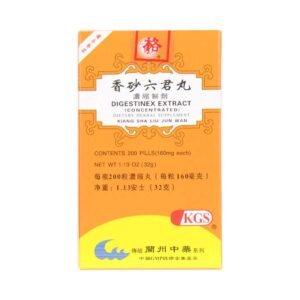 Xiang Sha Liu Jun Wan – Digestinex Extract – Lanzhou Traditional Herbs (KGS)
Starting at $7.89
Add to CartSelect options
This product has multiple variants. The options may be chosen on the product page
Xiang Sha Liu Jun Wan – Digestinex Extract – Lanzhou Traditional Herbs (KGS)
Starting at $7.89
Add to CartSelect options
This product has multiple variants. The options may be chosen on the product page
Xiang Sha Liu Jun Zi Wan (Six-Gentlemen Teapills with Aromatic Herbs)
This formula enhances the original Liu Jun Zi Tang by adding aromatic herbs to strengthen the Spleen, remove dampness, and ensure the smooth flow of Qi. It’s particularly useful for nausea due to Spleen Qi Deficiency with some dampness build-up.
Traditional Chinese Medicine Take: Vomiting
In some cases, nausea and vomiting go hand in hand. While no one enjoys vomiting, this is usually the body’s way of helping us rid ourselves of potentially harmful material in the gut so we can feel better. But, that’s not always the case. Sometimes we vomit when there isn’t anything to “eliminate,” but rather because there is an imbalance in the body.
What Causes Vomiting?
According to TCM, vomiting is primarily caused by a disruption in the Stomach’s Qi, which should naturally move downwards to digest food (similar to nausea). When Qi flows in the wrong direction—upwards instead of downwards—it leads to vomiting. But what’s behind this reversal of Qi?
A common cause is something you ate. Eating habits that include consuming too much spicy, greasy, or cold food can generate internal heat or coldness, which disrupts the Stomach’s balance and leads to vomiting.
Our emotions can play a role, too. Strong emotions such as stress, anxiety, or anger can affect the Liver’s ability to ensure smooth flow of Qi throughout the body. When the liver Qi stagnates or attacks the stomach, it can cause the stomach Qi to rebel upwards, resulting in vomiting.
Or, a weakness in the Spleen and Stomach can also lead to vomiting. These organs are central to digestion – and our whole-body health. A deficiency in Spleen Qi can lead to a buildup of dampness and phlegm in the abdomen which triggers nausea and vomiting, while a weak Stomach may fail to keep its contents down.
Vomiting and Patterns of Imbalance
TCM diagnoses vomiting based on different patterns of imbalance, each with its unique set of causes and accompanying symptoms:
- Stomach Heat
Excessive heat in the stomach can irritate its lining, causing the stomach Qi to ascend and leading to vomiting, intense thirst, and a preference for cold drinks. - Liver Overacting on Stomach
Emotional upset can cause liver Qi to stagnate and subsequently invade the stomach, disrupting its descending function and causing vomiting along with symptoms like rib-side pain and irritability. - Spleen and Stomach Deficiency
A deficiency in the spleen and stomach Qi means these organs cannot perform their roles in digestion effectively, leading to an inability to retain food and resulting in vomiting, fatigue, and a pale tongue.
3 Chinese Herbal Formulas for Vomiting Relief
-
Sale!
 Ban Xia (Pinellia Tuber)- Liquid Extract (Tincture)
Starting at $14.00
Add to CartSelect options
This product has multiple variants. The options may be chosen on the product page
Ban Xia (Pinellia Tuber)- Liquid Extract (Tincture)
Starting at $14.00
Add to CartSelect options
This product has multiple variants. The options may be chosen on the product page
Ban Xia (Pinellia Tuber Tincture)
Ban Xia is one of the most effective herbal remedies for vomiting due to phlegm and a disharmony in the digestive tract. This herb may be right for you if you experience alternating feelings of fullness and emptiness, and the presence of both heat and cold. It harmonizes the stomach, directs rebellious Qi downward, and stops vomiting.
-
Sale!
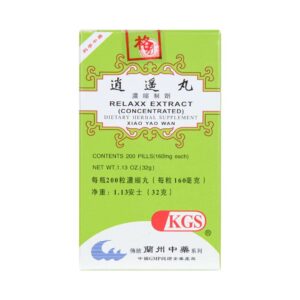 Xiao Yao Wan – Relaxx Extract – Lanzhou Traditional Herbs (KGS)
Starting at $7.89
Add to CartSelect options
This product has multiple variants. The options may be chosen on the product page
Xiao Yao Wan – Relaxx Extract – Lanzhou Traditional Herbs (KGS)
Starting at $7.89
Add to CartSelect options
This product has multiple variants. The options may be chosen on the product page
Xiao Yao Wan (Free and Easy Wanderer Teapills)
Xiao Yao San is a classic Chinese herbal formula that aims to soothe the Liver, strengthen the Spleen, nourish the blood, and ensure the smooth flow of Qi throughout the body. This includes the digestive tract. Xiao Yao Wan is particularly effective in cases where stress, anxiety, or emotional tension is contributing to vomiting.
-
Sale!
 Zi Su Ye (Perilla Leaf)- Liquid Extract (Tincture)
Starting at $14.00
Add to CartSelect options
This product has multiple variants. The options may be chosen on the product page
Zi Su Ye (Perilla Leaf)- Liquid Extract (Tincture)
Starting at $14.00
Add to CartSelect options
This product has multiple variants. The options may be chosen on the product page
Zi Su Ye (Perilla Leaf Tincture)
This gentle tincture is helpful when vomiting is due to digestive weakness, damp and phlegm accumulation, motion sickness, or morning sickness. The best way to take this formula is to add a dose to a cup of fresh ginger tea or Instant Ginger Crystals to get stomach-calming benefits of both perilla leaf and ginger.
Restore Your Gut Harmony with Chinese Herbal Medicine
Did you notice that many of the same patterns of imbalance show up repeatedly in these different symptoms? That’s because issues like a weak Spleen, dampness, and Liver stagnation are common – and often interrelated – issues that affect our digestive harmony.
The good news is that with the help of these and other digestive care formulas, you can bring your gut back into balance and avoid the discomfort of stomach upset. Learn more about gut health here, and discover other herbal formulas for healthy digestion!


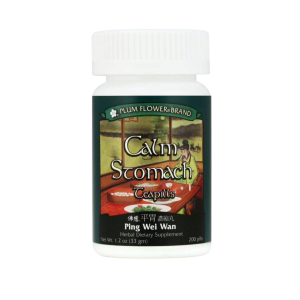 Plum Flower – Calm Stomach (Ping Wei Wan)
Plum Flower – Calm Stomach (Ping Wei Wan)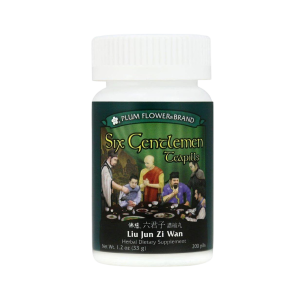 Plum Flower – Six Gentlemen Teapills (Liu Jun Zi Wan)
Plum Flower – Six Gentlemen Teapills (Liu Jun Zi Wan)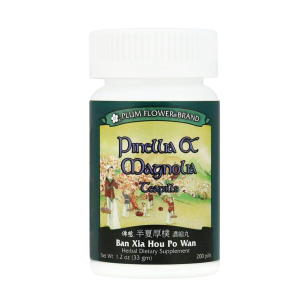 Plum Flower – Pinellia and Magnolia Teapills (Ban Xia Hou Po Wan)
Plum Flower – Pinellia and Magnolia Teapills (Ban Xia Hou Po Wan)